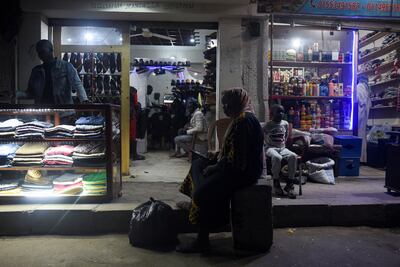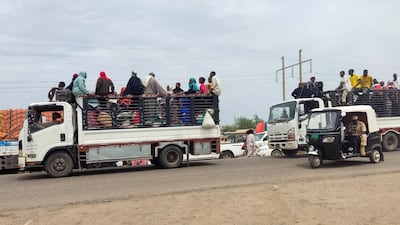Egypt is toughening its stance on migration, specifically targeting the Sudanese – who, at more than four million, are by far the largest single group in the country – in a government campaign to regulate the stay of nine million foreign residents.
Egypt has historically been a magnet for migrants and refugees, taking in hundreds of thousands of Arabs, sub-Saharan Africans and Europeans fleeing wars, colonial rule or persecution over the years.
More recently, Iraqis, Syrians and Yemenis arrived in Egypt in droves to escape conflict in their respective countries. In the 14 months since war broke out in Sudan between the army and a powerful paramilitary, more than one million Sudanese are estimated to have come to Egypt.
The war in Sudan has displaced more than eight million people, of whom about two million have sought refuge in neighbouring nations, mainly Egypt, Chad and South Sudan, according to figures from UN agencies.
Of the estimated one million who went to Egypt, between 500,000 and 600,000 are thought to have illegally crossed into the country, making the perilous journey across the desert with smugglers charging 300,000 Sudanese pounds (about $500) per person, according to migrants.
Scores have perished from heat stroke or thirst during the journey – which is mostly made in the back of pickup lorries without any cover to shield them from the sun or sand. The difficulty of obtaining a visa to enter Egypt has pushed them to take this route.
In recent weeks, Egypt has deported hundreds of Sudanese migrants who entered the country illegally.
In districts of Cairo where the Sudanese are known to live in large numbers, police stop them on the street to check their immigration documents are in order.
Anyone who cannot prove legal residence is arrested and deported, a practice that has forced many to stay home and venture out only when necessary.
Several Sudanese schools in Cairo have also been shut down by authorities for not having permits or because the premises are said to not meet health and safety requirements. Similarly, unlicensed food stores or cafes serving Sudanese food and goods have also been closed.
A deadline given by Egyptian authorities to foreign nationals to legalise their immigration status expired on July 1, raising concern among the Sudanese community of a dramatic intensification of the crackdown on illegal residents.
On social media, Egyptians are criticising the presence of the Sudanese in some Cairo districts, blaming them for soaring apartment rents and shaming them for taking advantage of state subsidies on basic items and services.
Milad Hanna, a rights lawyer specialising in migrants’ affairs, says the predicament of the Sudanese in Egypt has been worsened by the waiting period – which sometimes can be months – before they can visit a UN refugee agency bureau or state immigration office to regulate their status.
About 200,000 Sudanese are on the waiting list to register as refugees or asylum applicants with the UNHCR, the UN’s refugee agency, Mr Hanna said. He also said he disapproves of police stopping people on the streets and arresting those whose residence permits have expired.
“This campaign looks like it will last a long time,” he said. “Demanding to see proof of valid residence or visa should only be done in the case of a public disturbance or cases of blatant lawbreaking.”
Nasser Mohammed Nasser says he, his wife and three children crossed illegally into Egypt last year after months of waiting in vain for an Egyptian visa. The family began the journey in Sudan’s northern city of Wadi Halfa and arrived in Aswan, Egypt’s southernmost city, three days later.
“We registered with UNHCR in Cairo but we are still afraid to leave our home after we heard so many stories about Sudanese getting arrested on the street and deported.
“We lost everything we had in Khartoum. As Sudanese, Egypt is the closest country to our heart. We are emotionally attached to Egypt through language, religion and common history. Life is tough here, but it’s much tougher back in Sudan,” he said.
Egypt and Sudan have had close social, economic and cultural ties dating back to Pharaonic times. The two nations in north-east Africa were one nation until 1956, when Sudan voted for self-determination at the end of Anglo-Egyptian rule.
Sudan's secession, however, has not broken the two Nile-basin nations' close ties, with visa-free travel between the two nations cementing their bonds.
However, the two countries have an unresolved border dispute that occasionally surfaces and sours relations. Moreover, some Sudanese, especially leftist and nationalist politicians, are resentful of what they see as Egypt’s constant meddling in the affairs of their country.
Osman Al Mirghani, a prominent Sudanese newspaper publisher and analyst who now lives in Cairo, suspects that the Rapid Support Forces, the paramilitary fighting the army in Sudan, may be behind the social media campaign against Sudanese in Egypt.
“It has a very destructive effect on relations and it comes at a very sensitive time,” Mr Al Mirghani said. “The majority of Sudanese prefer Egypt over anywhere else in the region or in the West.
“They have realised after coming to live here that relations between Egypt and Sudan are much better than they had previously thought,” said Mr Al Mirghani, who has lived in Cairo since 2023.
Egyptian President Abdel Fattah El Sisi makes a point of calling foreign residents in Egypt “our guests” and often boasts that, unlike elsewhere in the region, his country allows migrants to work and live alongside Egyptians, and does not keep them in camps.
It costs the Sudanese the equivalent of $25 to secure a six-month stay in Egypt.
However, the Egyptian leader has recently talked about the cost of hosting such a large community of foreign residents. That, in turn, may have inadvertently fuelled xenophobia at a time when most Egyptians are struggling to make ends meet amid a grinding economic crisis.
Last month, Mr El Sisi said hosting foreign nationals in Egypt costs the treasury $10 billion annually. They consume 4.5 billion cubic meters of water per year, he added, alluding to Egypt having one of the world’s lowest per capita shares of fresh water at 500 cubic metres a year.
However, some Sudanese people, such as Cairo-based businessman Yasser Abdallah, are convinced that Egypt remains the only country apart from home where he and his compatriots feel comfortable.
“Many of us behave randomly and sometimes forget that we are not in Sudan,” he said. “Every non-Egyptian here is treated as a foreigner except us. On the border with Egypt, the Egyptians treat us better than the Sudanese do on our side of the border.”
However, some Sudanese report racially motivated, minor acts of violence by Egyptians against members of their community, but they insist they remain isolated incidents rather than a trend.
Company%20profile
%3Cp%3E%3Cstrong%3ECompany%20name%3A%3C%2Fstrong%3E%20Fasset%0D%3Cbr%3E%3Cstrong%3EStarted%3A%20%3C%2Fstrong%3E2019%0D%3Cbr%3E%3Cstrong%3EFounders%3A%3C%2Fstrong%3E%20Mohammad%20Raafi%20Hossain%2C%20Daniel%20Ahmed%0D%3Cbr%3E%3Cstrong%3EBased%3A%3C%2Fstrong%3E%20Dubai%0D%3Cbr%3E%3Cstrong%3ESector%3A%20%3C%2Fstrong%3EFinTech%0D%3Cbr%3E%3Cstrong%3EInitial%20investment%3A%3C%2Fstrong%3E%20%242.45%20million%0D%3Cbr%3E%3Cstrong%3ECurrent%20number%20of%20staff%3A%3C%2Fstrong%3E%2086%0D%3Cbr%3E%3Cstrong%3EInvestment%20stage%3A%3C%2Fstrong%3E%20Pre-series%20B%0D%3Cbr%3E%3Cstrong%3EInvestors%3A%3C%2Fstrong%3E%20Investcorp%2C%20Liberty%20City%20Ventures%2C%20Fatima%20Gobi%20Ventures%2C%20Primal%20Capital%2C%20Wealthwell%20Ventures%2C%20FHS%20Capital%2C%20VN2%20Capital%2C%20local%20family%20offices%3C%2Fp%3E%0A
Europe’s rearming plan
- Suspend strict budget rules to allow member countries to step up defence spending
- Create new "instrument" providing €150 billion of loans to member countries for defence investment
- Use the existing EU budget to direct more funds towards defence-related investment
- Engage the bloc's European Investment Bank to drop limits on lending to defence firms
- Create a savings and investments union to help companies access capital
Aquaman%20and%20the%20Lost%20Kingdom
%3Cp%3E%3Cstrong%3EDirector%3A%3C%2Fstrong%3E%20James%20Wan%3C%2Fp%3E%0A%3Cp%3E%3Cstrong%3EStarring%3A%3C%2Fstrong%3E%20Jason%20Mamoa%2C%20Patrick%20Wilson%2C%20Amber%20Heard%2C%20Yahya%20Abdul-Mateen%20II%C2%A0%3C%2Fp%3E%0A%3Cp%3E%3Cstrong%3ERating%3A%3C%2Fstrong%3E%202%2F5%3C%2Fp%3E%0A
THREE
%3Cp%3EDirector%3A%20Nayla%20Al%20Khaja%3C%2Fp%3E%0A%3Cp%3EStarring%3A%20Jefferson%20Hall%2C%20Faten%20Ahmed%2C%20Noura%20Alabed%2C%20Saud%20Alzarooni%3C%2Fp%3E%0A%3Cp%3ERating%3A%203.5%2F5%3C%2Fp%3E%0A
THE RESULTS
5pm: Maiden (PA) Dh80,000 1,400m
Winner: Alnawar, Connor Beasley (jockey), Helal Al Alawi (trainer)
5.30pm: Maiden (PA) Dh80,000 1,400m
Winner: Raniah, Noel Garbutt, Ernst Oertel
6pm: Handicap (PA) Dh90,000 2,200m
Winner: Saarookh, Richard Mullen, Ana Mendez
6.30pm: Sheikh Zayed bin Sultan Al Nahyan Jewel Crown (PA) Rated Conditions Dh125,000 1,600m
Winner: RB Torch, Tadhg O’Shea, Eric Lemartinel
7pm: Al Wathba Stallions Cup Handicap Dh70,000 1,600m
Winner: MH Wari, Antonio Fresu, Elise Jeane
7.30pm: Handicap Dh90,000 1,600m
Winner: Mailshot, Royston Ffrench, Salem bin Ghadayer
T20 WORLD CUP QUALIFIER
Results
UAE beat Nigeria by five wickets
Hong Kong beat Canada by 32 runs
Friday fixtures
10am, Tolerance Oval, Abu Dhabi – Ireland v Jersey
7.30pm, Zayed Cricket Stadium, Abu Dhabi – Canada v Oman
Gulf Under 19s final
Dubai College A 50-12 Dubai College B
Groom and Two Brides
Director: Elie Semaan
Starring: Abdullah Boushehri, Laila Abdallah, Lulwa Almulla
Rating: 3/5
FIXTURES
All kick-off times UAE ( 4 GMT)
Friday
Sevilla v Levante (midnight)
Saturday
Athletic Bilbao v Real Sociedad (7.15pm)
Eibar v Valencia (9.30pm)
Atletico Madrid v Alaves (11.45pm)
Sunday
Girona v Getafe (3pm)
Celta Vigo v Villarreal (7.15pm)
Las Palmas v Espanyol (9.30pm)
Barcelona v Deportivo la Coruna (11.45pm)
Monday
Malaga v Real Betis (midnight)
GAC GS8 Specs
Engine: 2.0-litre 4cyl turbo
Power: 248hp at 5,200rpm
Torque: 400Nm at 1,750-4,000rpm
Transmission: 8-speed auto
Fuel consumption: 9.1L/100km
On sale: Now
Price: From Dh149,900
RESULTS
Bantamweight:
Zia Mashwani (PAK) bt Chris Corton (PHI)
Super lightweight:
Flavio Serafin (BRA) bt Mohammad Al Khatib (JOR)
Super lightweight:
Dwight Brooks (USA) bt Alex Nacfur (BRA)
Bantamweight:
Tariq Ismail (CAN) bt Jalal Al Daaja (JOR)
Featherweight:
Abdullatip Magomedov (RUS) bt Sulaiman Al Modhyan (KUW)
Middleweight:
Mohammad Fakhreddine (LEB) bt Christofer Silva (BRA)
Middleweight:
Rustam Chsiev (RUS) bt Tarek Suleiman (SYR)
Welterweight:
Khamzat Chimaev (SWE) bt Mzwandile Hlongwa (RSA)
Lightweight:
Alex Martinez (CAN) bt Anas Siraj Mounir (MAR)
Welterweight:
Jarrah Al Selawi (JOR) bt Abdoul Abdouraguimov (FRA)
Results
Ashraf Ghani 50.64 per cent
Abdullah Abdullah 39.52 per cent
Gulbuddin Hekmatyar 3.85 per cent
Rahmatullah Nabil 1.8 per cent
BOSH!'s pantry essentials
Nutritional yeast
This is Firth's pick and an ingredient he says, "gives you an instant cheesy flavour". He advises making your own cream cheese with it or simply using it to whip up a mac and cheese or wholesome lasagne. It's available in organic and specialist grocery stores across the UAE.
Seeds
"We've got a big jar of mixed seeds in our kitchen," Theasby explains. "That's what you use to make a bolognese or pie or salad: just grab a handful of seeds and sprinkle them over the top. It's a really good way to make sure you're getting your omegas."
Umami flavours
"I could say soya sauce, but I'll say all umami-makers and have them in the same batch," says Firth. He suggests having items such as Marmite, balsamic vinegar and other general, dark, umami-tasting products in your cupboard "to make your bolognese a little bit more 'umptious'".
Onions and garlic
"If you've got them, you can cook basically anything from that base," says Theasby. "These ingredients are so prevalent in every world cuisine and if you've got them in your cupboard, then you know you've got the foundation of a really nice meal."
Your grain of choice
Whether rice, quinoa, pasta or buckwheat, Firth advises always having a stock of your favourite grains in the cupboard. "That you, you have an instant meal and all you have to do is just chuck a bit of veg in."
The biog
Hobby: "It is not really a hobby but I am very curious person. I love reading and spend hours on research."
Favourite author: Malcom Gladwell
Favourite travel destination: "Antigua in the Caribbean because I have emotional attachment to it. It is where I got married."
COMPANY%20PROFILE
%3Cp%3E%3Cstrong%3ECompany%20name%3C%2Fstrong%3E%3A%20ASI%20(formerly%20DigestAI)%3C%2Fp%3E%0A%3Cp%3E%3Cstrong%3EStarted%3A%3C%2Fstrong%3E%202017%3C%2Fp%3E%0A%3Cp%3E%3Cstrong%3EFounders%3A%3C%2Fstrong%3E%20Quddus%20Pativada%3C%2Fp%3E%0A%3Cp%3E%3Cstrong%3EBased%3A%3C%2Fstrong%3E%20Dubai%2C%20UAE%3C%2Fp%3E%0A%3Cp%3E%3Cstrong%3EIndustry%3A%3C%2Fstrong%3E%20Artificial%20intelligence%2C%20education%20technology%3C%2Fp%3E%0A%3Cp%3E%3Cstrong%3EFunding%3A%3C%2Fstrong%3E%20%243%20million-plus%3C%2Fp%3E%0A%3Cp%3E%3Cstrong%3EInvestors%3A%3C%2Fstrong%3E%20GSV%20Ventures%2C%20Character%2C%20Mark%20Cuban%3C%2Fp%3E%0A
Auron Mein Kahan Dum Tha
Starring: Ajay Devgn, Tabu, Shantanu Maheshwari, Jimmy Shergill, Saiee Manjrekar
Director: Neeraj Pandey
Rating: 2.5/5
FIXTURES
All games 6pm UAE on Sunday:
Arsenal v Watford
Burnley v Brighton
Chelsea v Wolves
Crystal Palace v Tottenham
Everton v Bournemouth
Leicester v Man United
Man City v Norwich
Newcastle v Liverpool
Southampton v Sheffield United
West Ham v Aston Villa
UPI facts
More than 2.2 million Indian tourists arrived in UAE in 2023
More than 3.5 million Indians reside in UAE
Indian tourists can make purchases in UAE using rupee accounts in India through QR-code-based UPI real-time payment systems
Indian residents in UAE can use their non-resident NRO and NRE accounts held in Indian banks linked to a UAE mobile number for UPI transactions
The specs
Engine: 3.9-litre twin-turbo V8
Transmission: seven-speed
Power: 720hp
Torque: 770Nm
Price: Dh1,100,000
On sale: now
The%20trailblazers
%3Cp%3ESixteen%20boys%20and%2015%20girls%20have%20gone%20on%20from%20Go-Pro%20Academy%20in%20Dubai%20to%20either%20professional%20contracts%20abroad%20or%20scholarships%20in%20the%20United%20States.%20Here%20are%20two%20of%20the%20most%20prominent.%0D%3C%2Fp%3E%0A%3Cp%3E%3Cstrong%3EGeorgia%20Gibson%20(Newcastle%20United)%3C%2Fstrong%3E%0D%3Cbr%3EThe%20reason%20the%20academy%20in%20Dubai%20first%20set%20up%20a%20girls%E2%80%99%20programme%20was%20to%20help%20Gibson%20reach%20her%20potential.%20Now%20she%20plays%20professionally%20for%20Newcastle%20United%20in%20the%20UK.%0D%3C%2Fp%3E%0A%3Cp%3E%3Cstrong%3EMackenzie%20Hunt%20(Everton)%3C%2Fstrong%3E%0D%3Cbr%3EAttended%20DESS%20in%20Dubai%2C%20before%20heading%20to%20the%20UK%20to%20join%20Everton%20full%20time%20as%20a%20teenager.%20He%20was%20on%20the%20bench%20for%20the%20first%20team%20as%20recently%20as%20their%20fixture%20against%20Brighton%20on%20February%2024.%0D%3C%2Fp%3E%0A
ACC%20T20%20Women%E2%80%99s%20Championship
%3Cp%3E%3Cstrong%3EUAE%20fixtures%3C%2Fstrong%3E%3Cbr%3EFriday%2C%20June%2017%20v%20Oman%3Cbr%3ESaturday%2C%20June%2018%20v%20Singapore%3Cbr%3EMonday%2C%20June%2020%20v%20Malaysia%3Cbr%3EWednesday%2C%20June%2022%20v%20Qatar%3Cbr%3EFriday%2C%20June%2024%2C%20semi-final%3Cbr%3ESaturday%2C%20June%2025%2C%20final%3Cbr%3E%20%3Cbr%3E%3Cstrong%3EUAE%20squad%3A%3C%2Fstrong%3E%20Chaya%20Mughal%20(captain)%2C%20Esha%20Oza%2C%20Indhuja%20Nandakumar%2C%20Kavisha%20Kumari%2C%20Khushi%20Sharma%2C%20Lavanya%20Keny%2C%20Priyanjali%20Jain%2C%20Rithika%20Rajith%2C%20Samaira%20Dharnidharka%2C%20Sanchin%20Singh%2C%20Siya%20Gokhale%2C%20Suraksha%20Kotte%2C%20Theertha%20Satish%2C%20Vaishnave%20Mahesh%3C%2Fp%3E%0A
Bridgerton%20season%20three%20-%20part%20one
%3Cp%3E%3Cstrong%3EDirectors%3A%20%3C%2Fstrong%3EVarious%3C%2Fp%3E%0A%3Cp%3E%3Cstrong%3EStarring%3A%3C%2Fstrong%3E%20Nicola%20Coughlan%2C%20Luke%20Newton%2C%20Jonathan%20Bailey%3C%2Fp%3E%0A%3Cp%3E%3Cstrong%3ERating%3A%20%3C%2Fstrong%3E3%2F5%3C%2Fp%3E%0A
In Search of Mary Shelley: The Girl Who Wrote Frankenstein
By Fiona Sampson
Profile
Who's who in Yemen conflict
Houthis: Iran-backed rebels who occupy Sanaa and run unrecognised government
Yemeni government: Exiled government in Aden led by eight-member Presidential Leadership Council
Southern Transitional Council: Faction in Yemeni government that seeks autonomy for the south
Habrish 'rebels': Tribal-backed forces feuding with STC over control of oil in government territory
Arabian Gulf Cup FINAL
Al Nasr 2
(Negredo 1, Tozo 50)
Shabab Al Ahli 1
(Jaber 13)
liverpool youngsters
Ki-Jana Hoever
The only one of this squad to have scored for Liverpool, the versatile Dutchman impressed on his debut at Wolves in January. He can play right-back, centre-back or in midfield.
Herbie Kane
Not the most prominent H Kane in English football but a 21-year-old Bristolian who had a fine season on loan at Doncaster last year. He is an all-action midfielder.
Luis Longstaff
Signed from Newcastle but no relation to United’s brothers Sean and Matty, Luis is a winger. An England Under-16 international, he helped Liverpool win the FA Youth Cup last season.
Yasser Larouci
An 18-year-old Algerian-born winger who can also play as a left-back, Larouci did well on Liverpool’s pre-season tour until an awful tackle by a Sevilla player injured him.
Adam Lewis
Steven Gerrard is a fan of his fellow Scouser, who has been on Liverpool’s books since he was in the Under-6s, Lewis was a midfielder, but has been converted into a left-back.
Company%20profile
%3Cp%3E%3Cstrong%3EName%3A%3C%2Fstrong%3E%20Yabi%20by%20Souqalmal%C2%A0%3C%2Fp%3E%0A%3Cp%3E%3Cstrong%3EStarted%3A%20%3C%2Fstrong%3EMay%202022%2C%20launched%20June%202023%3C%2Fp%3E%0A%3Cp%3E%3Cstrong%3EFounder%3A%20%3C%2Fstrong%3EAmbareen%20Musa%3C%2Fp%3E%0A%3Cp%3E%3Cstrong%3EBased%3A%20%3C%2Fstrong%3EDubai%C2%A0%3C%2Fp%3E%0A%3Cp%3E%3Cstrong%3ESector%3A%20%3C%2Fstrong%3EFinTech%C2%A0%3C%2Fp%3E%0A%3Cp%3E%3Cstrong%3EInitial%20investment%3A%20u%3C%2Fstrong%3Endisclosed%20but%20soon%20to%20be%20announced%C2%A0%3C%2Fp%3E%0A%3Cp%3E%3Cstrong%3ENumber%20of%20staff%3A%20%3C%2Fstrong%3E12%C2%A0%3C%2Fp%3E%0A%3Cp%3E%3Cstrong%3EInvestment%20stage%3A%20%3C%2Fstrong%3Eseed%C2%A0%C2%A0%3C%2Fp%3E%0A%3Cp%3E%3Cstrong%3EInvestors%3A%20%3C%2Fstrong%3EShuaa%20Capital%3C%2Fp%3E%0A
The Year Earth Changed
Directed by:Tom Beard
Narrated by: Sir David Attenborough
Stars: 4
Switching%20sides
%3Cp%3EMahika%20Gaur%20is%20the%20latest%20Dubai-raised%20athlete%20to%20attain%20top%20honours%20with%20another%20country.%0D%3C%2Fp%3E%0A%3Cp%3E%3Cstrong%3EVelimir%20Stjepanovic%20(Serbia%2C%20swimming)%20%3C%2Fstrong%3E%0D%3Cbr%3EBorn%20in%20Abu%20Dhabi%20and%20raised%20in%20Dubai%2C%20he%20finished%20sixth%20in%20the%20final%20of%20the%202012%20Olympic%20Games%20in%20London%20in%20the%20200m%20butterfly%20final.%20%0D%3C%2Fp%3E%0A%3Cp%3E%3Cstrong%3EJonny%20Macdonald%20(Scotland%2C%20rugby%20union)%20%3C%2Fstrong%3E%0D%3Cbr%3EBrought%20up%20in%20Abu%20Dhabi%20and%20represented%20the%20region%20in%20international%20rugby.%20When%20the%20Arabian%20Gulf%20team%20was%20broken%20up%20into%20its%20constituent%20nations%2C%20he%20opted%20to%20play%20for%20Scotland%20instead%2C%20and%20went%20to%20the%20Hong%20Kong%20Sevens.%20%0D%3C%2Fp%3E%0A%3Cp%3E%3Cstrong%3ESophie%20Shams%20(England%2C%20rugby%20union)%20%3C%2Fstrong%3E%0D%3Cbr%3EThe%20daughter%20of%20an%20English%20mother%20and%20Emirati%20father%2C%20Shams%20excelled%20at%20rugby%20in%20Dubai%2C%20then%20after%20attending%20university%20in%20the%20UK%20played%20for%20England%20at%20sevens.%20%0D%3C%2Fp%3E%0A
TV: World Cup Qualifier 2018 matches will be aired on on OSN Sports HD Cricket channel
Bib%20Gourmand%20restaurants
%3Cp%3EAl%20Khayma%0D%3Cbr%3EBait%20Maryam%0D%3Cbr%3EBrasserie%20Boulud%0D%3Cbr%3EFi'lia%0D%3Cbr%3Efolly%0D%3Cbr%3EGoldfish%0D%3Cbr%3EIbn%20AlBahr%0D%3Cbr%3EIndya%20by%20Vineet%0D%3Cbr%3EKinoya%0D%3Cbr%3ENinive%0D%3Cbr%3EOrfali%20Bros%0D%3Cbr%3EReif%20Japanese%20Kushiyaki%0D%3Cbr%3EShabestan%0D%3Cbr%3ETeible%3C%2Fp%3E%0A
THE DETAILS
Deadpool 2
Dir: David Leitch
Starring: Ryan Reynolds, Josh Brolin, Justin Dennison, Zazie Beetz
Four stars
Four%20scenarios%20for%20Ukraine%20war
%3Cp%3E1.%20Protracted%20but%20less%20intense%20war%20(60%25%20likelihood)%3C%2Fp%3E%0A%3Cp%3E2.%20Negotiated%20end%20to%20the%20conflict%20(30%25)%3C%2Fp%3E%0A%3Cp%3E3.%20Russia%20seizes%20more%20territory%20(20%25)%3C%2Fp%3E%0A%3Cp%3E4.%20Ukraine%20pushes%20Russia%20back%20(10%25)%3C%2Fp%3E%0A%3Cp%3E%3Cem%3EForecast%20by%20Economist%20Intelligence%20Unit%3C%2Fem%3E%3C%2Fp%3E%0A
INDIA SQUADS
India squad for third Test against Sri Lanka
Virat Kohli (capt), Murali Vijay, Lokesh Rahul, Shikhar Dhawan, Cheteshwar Pujara, Ajinkya Rahane, Rohit Sharma, Wriddhiman Saha, Ravichandran Ashwin, Ravindra Jadeja, Kuldeep Yadav, Mohammed Shami, Umesh Yadav, Ishant Sharma, Vijay Shankar
India squad for ODI series against Sri Lanka
Rohit Sharma (capt), Shikhar Dhawan, Ajinkya Rahane, Shreyas Iyer, Manish Pandey, Kedar Jadhav, Dinesh Karthik, Mahendra Singh Dhoni, Hardik Pandya, Axar Patel, Kuldeep Yadav, Yuzvendra Chahal, Jasprit Bumrah, Bhuvneshwar Kumar, Siddarth Kaul
LOVE%20AGAIN
%3Cp%3EDirector%3A%20Jim%20Strouse%3C%2Fp%3E%0A%3Cp%3EStars%3A%20Priyanka%20Chopra%20Jonas%2C%20Sam%20Heughan%2C%20Celine%20Dion%3C%2Fp%3E%0A%3Cp%3ERating%3A%202%2F5%3C%2Fp%3E%0A
UAE currency: the story behind the money in your pockets
Zayed Sustainability Prize
UAE currency: the story behind the money in your pockets




